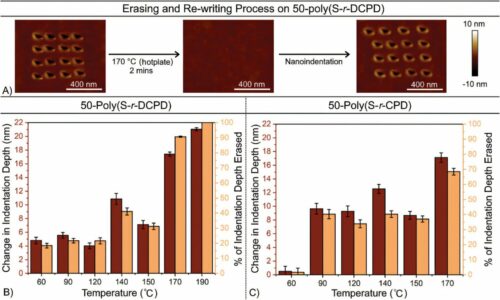Researchers develop a reusable polymer for high-density data storage, offering an eco-friendly alternative to traditional storage devices.

An innovative polymer designed by scientists at Flinders University is poised to transform high-density data storage. This low-cost material, crafted from sulphur and dicyclopentadiene, enables data storage in nanometer-scale indents, which can be erased and reused multiple times with short bursts of heat. The novel polymer presents a promising alternative to hard disk drives, solid-state drives, and flash memory.
The polymer works by encoding data as tiny “dents” on its surface, allowing for significantly higher data density than conventional storage methods. “This research unlocks the potential for using simple, renewable polysulphides in probe-based mechanical data storage,” explains Abigail Mann, lead author and PhD candidate, Flinders University.
Designed with energy efficiency and cost-effectiveness in mind, the innovation is expected to appeal to industries reliant on data management, including cloud storage providers, tech companies, and research organisations handling big data. Its unique ability to support repeated cycles of data writing, reading, and erasing makes it particularly attractive for computing applications where flexibility and sustainability are key.
To create and interpret the indents, researchers used advanced tools like atomic force microscopy and scanning probe instruments. Justin Chalker, senior author and professor emphasises the relevance of this innovation, stating, “The age of big data and artificial intelligence is increasingly driving demand for data storage solutions.”
One remarkable feature of the polymer is its ability to reorganise upon heating, erasing stored data within seconds. Unlike earlier mechanical storage strategies, which faced challenges due to high energy requirements and costs, this polymer offers a more sustainable and economical solution.
Highlighting its potential, Samuel Tonkin, Chalker Lab PhD candidate adds, “The low cost of the building blocks is an attractive feature that can support future development of the polymer in data storage applications.” As the demand for more efficient, high-density storage grows, this innovation might redefine the future of data storage technologies.






